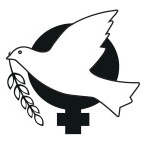 By Janette McLeod, WILPF Australia, 29 June 2015
By Janette McLeod, WILPF Australia, 29 June 2015
The centenary celebrations of WILPF in Australia at the end of May were enhanced considerably by the presence of our Secretary General Madeleine Rees. The celebrations, held in Australia’s capital Canberra, included a public conference, centenary Australian Peacewomen celebration, a historical exhibition and the Section’s triennial conference.
Madeleine arrived early in the country, travelling firstly to Brisbane where she spoke at the University of Queensland on The dream and the reality: are our international institutions fit for purpose? (Although the real purpose of her visit was to cuddle a koala.)
The Peacewomen celebrations honoured four prominent women:
- Helen Caldicott – physician, author and anti-nuclear advocate; founder of several associations dedicated to opposing the use of nuclear power, depleted uranium munitions, nuclear weapons, nuclear weapons proliferation, war and military action in general.
- Anne Gallagher – independent scholar and legal adviser to the United Nations and Association of South East Asian Nations; leading global expert on the international law in human trafficking, migrant smuggling, and transnational organised crime; named as a ‘Trafficking in Persons Hero’ by then US Secretary of State Hillary Clinton.
- Helen Durham – director for International Law and Policy at the International Committee of the Red Cross (ICRC) based in Geneva – the first Australian to be appointed as a Director with ICRC and the first woman Director of Law in the 150 year history of the organisation.
- Kirstie Parker – Co-Chair of the National Congress of Australia’s First Peoples, Director of Reconciliation Australia, and a Co-Chair of the national Close the Gap Campaign. Kirstie is also a member of the Deadly Awards Executive Academy; former editor of the 100% Aboriginal owned and controlled newspaper, the Koori Mail.
The Awards evening was opened by A Chorus of Women with an excerpt from their Community Oratorio A Passion for Peace. After this we were privileged to hear Kirstie speak; her words creating a poignant picture of the resilience and bravery of so many indigenous women who have struggled for recognition and visibility as the first custodians of the land we all walk on.
The following day, Australia held its own Women’s Power to Stop War conference, the aim of which was to look to the future and elicit ideas for future peacebuilding and conflict prevention actions, included three keynote speakers: WILPF Secretary General Madeleine Rees; Australia’s Ambassador for Women and Girls, Natasha Stott Despoja; and Mrs Shukriya Barakzai, a member of the Afghanistan Parliament. Two panel sessions of practitioners and academics looked at A Feminist Perspective on women’s Power to Stop war and Women Working Globally, and a lively debate on whether Government diplomacy or NGO advocacy were more effective in peacebuilding, got everyone thinking. The conference had a strong Young WILPF presence. It was MC’d by two Young WILPFers and two other Young WILPFers delivered the closing keynote address, on the next hundred years of feminism and WILPF action for peace.
A fantastic historical exhibition was held at the Canberra Museum and Art Gallery, celebrating the work of WILPF women in Australia.
Finally, we held our triennial conference, at which Madeleine reported on the 2015-18 International Programme adopted at the Congress; we discussed proposals for the Section’s work program and elected a new National Board. The conference also passed resolutions calling on the Australian government to take action in relation to Military Spending: US Bases in Australia; Nuclear, Arbitrary Removal of Citizenship; Internet Freedom, Seeking asylum is a human right and Humanitarian Aid.
Originally published: http://www.wilpfinternational.org/wilpf-australia-celebrates-the-centenary-of-the-organisation/